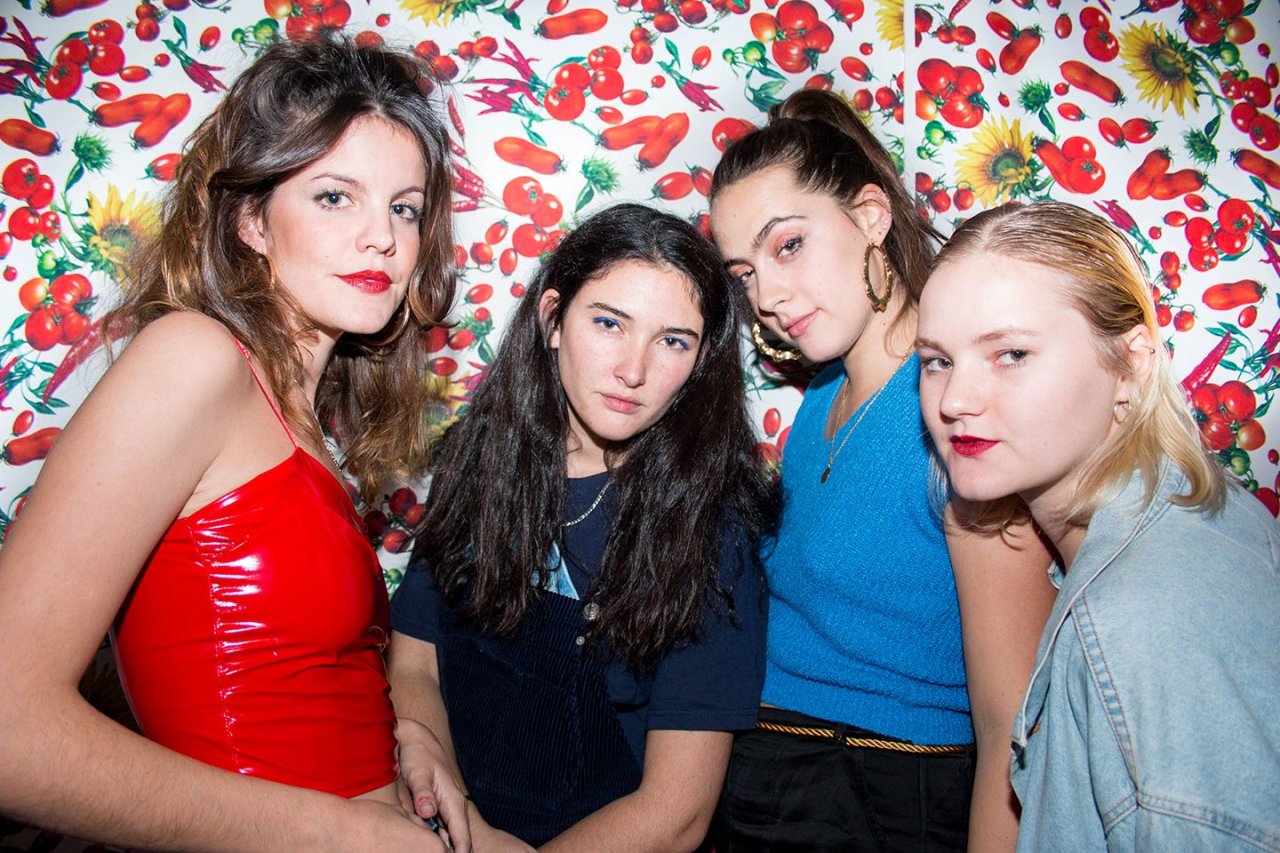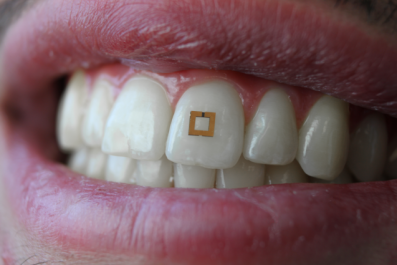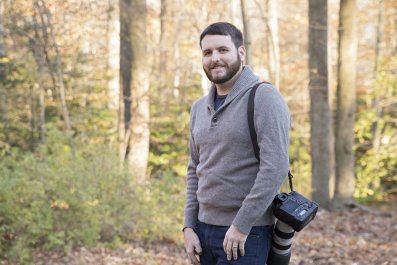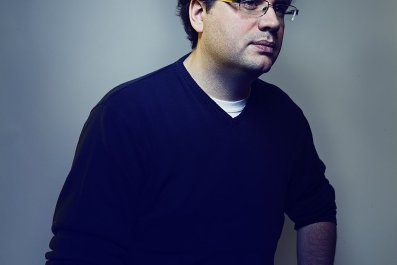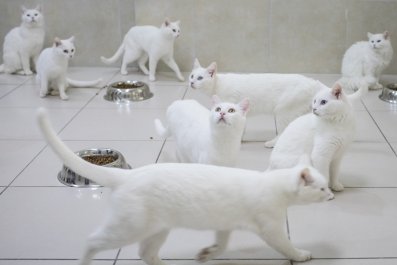Don't cross Hinds. The Spanish garage-rock band knows how to hold a grudge.
The Canadian group Dears, for instance, once threatened to sue the band. The trouble arose when Hinds, which had started as Deers (not Dears), was asked by the Canadian band's lawyer to change its name to mitigate confusion. And so, grudgingly, Deers became Hinds. "We still hate them," says the band's singer and guitarist, Ana García Perrote. "If you read this, we hate you! We're never gonna forget it!"
And then there's Kate Moss, who allegedly cold-shouldered the band's members at a music festival. Hinds hasn't forgotten. "She wouldn't take a picture," says Perrote. "She said no."
The best grudge of all, though, brought Hinds together. The Madrid-based group's origin story could be a rom-com screenplay: In 2010, Perrote met Hinds's other founding member, Carlotta Cosials, because her then-boyfriend was in a band with Cosials's then-boyfriend. Those boys turned out to be cheaters. But Perrote and Cosials became fast friends. So they ditched their significant others, forming their own band during a 2011 trip to Spain's Mediterranean coast.
"It was one of those holidays where you have nothing to do," Perrote recalls. "We took guitars because we knew how to play one chord. We just started playing and playing, and we forgot how to eat. We didn't do anything but play this Bob Dylan cover ['It Ain't Me, Baby']. We totally fell in love with the feeling of playing music."
The band, initially a duo, chose the name Deers because the Spanish expression for cheating on a partner—poner los cuernos—literally translates into "to put horns on somebody." Worth noting: They have become substantially more successful than their former boyfriends' band.
The early shows were embarrassing: "Just the two of us and just playing covers," Perrote says. "When you do a bad show and you feel bad onstage, it's really the worst thing you can have." But seven years after that formative seaside excursion, Hinds has blossomed into a lively and skilled indie-rock quartet with a growing American following and a knack for writing relentlessly catchy odes to romantic anguish. Perrote, 23, and Cosials, 27, share lead vocals, joined by 22-year-old Amber Grimbergen on drums and 26-year-old Ade Martín on bass. The debut album, Leave Me Alone, arrived in early 2016 and sent the band cavorting around the globe—playing clubs, sleeping on couches, collecting bizarre tour stories. "We really wanted the lifestyle that music gives you—the egos, the drugs, the falling in love constantly," says Cosials, whose silky, half-whispered vocals are a Hinds trademark. "It's real, all that stuff."
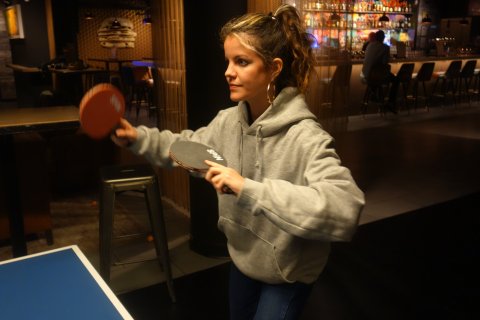
When I meet up with Hinds at Manhattan Ping-Pong parlor SPiN, co-owned by actress Susan Sarandon, the band is about to release a spirited second album called I Don't Run (now available via the Mom + Pop label in the U.S.). The music is characterized by brash hooks, Strokes-inspired lo-fi aesthetics and barbed lyrics populated with obnoxious, misbehaving men. (A sample lyric: "Why did you have to kiss me after sex? / Should I've known before you were also banging her?")
There's a Spanish word that sums up the band's lyrical inspiration—desamor—"but it doesn't exist in English," Perrote says. "It's not heartbreak, but..." Bandmate Martín interjects: "The bad feelings you get when love ends." "It's still about our personal experiences," Perrote adds. The members of the band all live in Madrid, but not together. "We share everything," Perrote says, "except our houses. And boyfriends."
The band's influences, besides Dylan, include the Clash, Creedence Clearwater Revival and the Beach Boys. A career milestone was opening for Brian Wilson's Pet Sounds show in Brooklyn in 2016. Cosials and Grimbergen crack each other up recounting an incident backstage. Seeing Keith Richards, they approached him for a photo. He obliged, they posted it on Facebook—and suddenly realized it wasn't Richards at all, just a member of Wilson's band who happened to resemble the Stones guitarist. "This random guy!" Grimbergen exclaims while Cosials is laughing too hard to form sentences. (The guitarist turned out to be Blondie Chaplin, a musician who is not Richards but has performed with the Rolling Stones.)
At SPiN, the Spanish rockers relate these tales from the road in between tense rounds of Ping-Pong. An early publicity photo of the Hinds crew has them posing with red and black Ping-Pong paddles. They play often during downtime at festivals, at least when they're not dealing with medical emergencies, like the time their tour manager's appendix exploded at England's Glastonbury Festival. ("It took Glastonbury like six hours to get him to a hospital," Perrote says. "He really almost died.")
The most significant Ping-Pong match in pop history was between Michael Jackson and Prince in 1985. (Prince won easily, and reportedly exclaimed, "He played like Helen Keller!") The second most important was between Prince and Jimmy Fallon; Prince won again. I'm not sure where the closely fought game between Perrote and me would rank on this list, but let the record reflect that I won by a very slight margin. Eventually, I also beat Martín and Cosials before we teamed up for a doubles round.
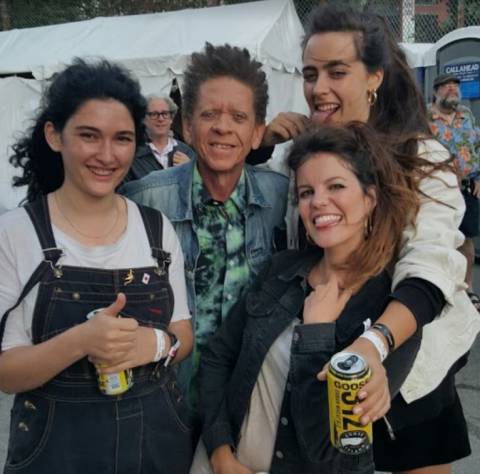
After we play, I'm treated to weird tour stories, some of them featuring super-creepy fans with poor grasp of boundaries. Here's Hinds's strangest story: After a gig in Seattle, they crashed at a male fan's grandparents' house while the grandparents were out of town. The guy gave them pot, but seemed a bit odd. When the bandmates went to sleep, things got weirder: "He went into the room and was staring at them while they were sleeping. Super creepy!" tour manager Fiona Campbell says. Martín adds: "We [could] see him sneaking in, looking at us sleep."
Hinds left early the next morning—and then realized the creep had been a total stranger. Campbell had assumed he knew one of the members, because he'd emailed Hinds' shared email address offering to let them stay, while the rest of the band had assumed he was her friend, because she accepted the offer of hospitality.
Related: On the brink of insanity with Iceage, Denmark's greatest punk band
The band recounts this story with much laughter and animated gesturing, but there is also tacit acknowledgment of the vulnerability of being four young women navigating an industry plagued with sexist or abusive men. Yet overall, Hinds has found audiences more receptive to their music in the U.S. than back home. Perrote suggests that has to do with our Riot Grrrl movement and the larger history of women in punk rock. "Spain is such a slower market," Perrote says. "It takes so much longer for people to just respect what you're doing." Martín adds: "In America, they really understand who we are and what we're doing. In Spain, they need things that prove what they want us to prove: that we're good musicians, or that we've been playing our instruments forever."
It helps that the band's lyrics are in English rather than their native tongue. "The words that came were in English because all the music we listen to is sung in English," Perrote explains. The new title, I Don't Run, was selected because it seemed to defy the classic rock clichés. "We liked thinking that we were going to go against all the rock and roll rules, like live fast, die young," Perrote says. "We're OK with that. We don't have to die tomorrow to be cool today."
The band also know how to light up a stage, something I saw firsthand when Hinds played in a packed Brooklyn club on a cold Tuesday night in January.
"New York treats us very well," Cosials says later. "I feel like New Yorkers have a lack of love. And we have a lot of love to give."



